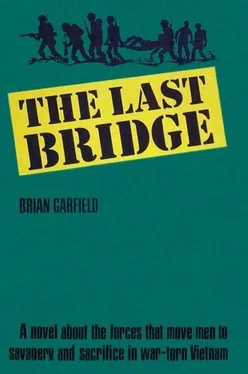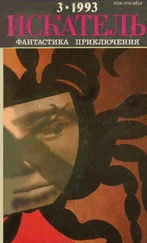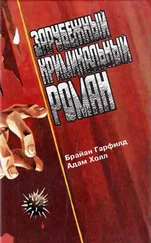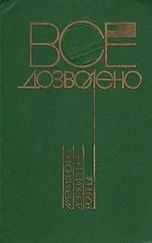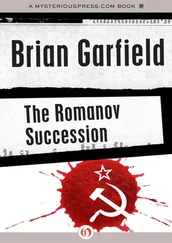“Shut up, Hooker.”
Hooker sliced his hand sideways as if making a quick sweeping judo chop. “Maybe if he had a wife to go back to, he might not be so puking anxious to get us all killed.”
Saville said, “If you want to stay alive, Sergeant, you’d better forget that. If there’s one man who can get you out of here and home free, it’s the Colonel.”
“I don’t need no Boy Scout’s help to get across the street. I look out for myself first. I figure everybody else does the same. The Colonel’s about to have enough trouble looking after his own hide.”
Hooker looked aft. He leaned forward confidentially. “And the same for you and me, Captain. Them two gooks back there. You understand what I mean, sir? Strike you funny, don’t it, the way that machine gun got jammed so handy? And the way that other gook was shooting, it seemed like he was trying on purpose to miss. Sir, seems to me we got trouble — up to here. We don’t need no more help from them gooks. Captain, if I was—”
“You’re not,” Saville barked softly. “Hooker, it’s one of a sergeant’s duties to keep his stupid opinions to himself.”
“Since when did Moses trot out an Eleventh Commandment?” J. D. Hooker demanded. “Captain, think about this — how many Vietnamese you know you can trust?”
Saville said, “You’re up as of right now for a Company Court, Sergeant. And a few more remarks will get you a Summary Court Martial. Clear?”
Hooker did not answer. But his eyes shifted toward the two Vietnamese, and his righteous expression made his thinking obvious. Saville thought, a jackass with chevrons was still a jackass. He growled in his throat. “Just keep your Goddamn mouth shut, Sergeant.”
Hooker sat like a Buddha, his eyes like a pair of black olives. Khang and Sun guarded the open endgate, their profiles as complementary as Greek masks: Khang’s mouth was upturned with defensive dry humor, and Sun’s mouth curved down.
The truck jammed to a halt. It upset Saville, jarred him; it brought him up on one knee, scooping up his weapon. He moved his agile bulk toward the back of the truck, glimpsing Sergeant Sun’s alert stare and the bright flash of Khang’s excited, strained grin. Hooker grumbled something behind him. Saville vaulted the tailgate and dropped to a crouch behind the truck, sweeping the jungle with sharp inspection; he braced the submachine gun stock inside the crook of his elbow, and his finger whitened on the trigger.
Boots trotted alongside the truck. He heard David Tyreen’s calm, practical voice: “Heads up, now.”
Tyreen wheeled around beside him. “Roadblock about four hundred yards ahead.”
“Where are we?”
“About two miles short of the bridge. Sergeant Khang!”
“Right, sir.” Khang dropped to the ground.
“Take the jack up front and jack up the front axle. Pretend you’re changing the left-hand tire.”
Khang crouched under the truck to unhook the axle-jack. Tyreen said to Saville, “They’ve seen us from the roadblock. Changing a tire ought to keep them from getting too suspicious. Theodore, you take Corporal Smith and work your way up to the roadblock. Set yourselves to jump them. Knives and garrotes — we’re too close to the bridge for noise. I’ll give you five minutes to post yourselves. Then we’ll drive up to the roadblock. When we’ve got their attention, jump them.”
“How many?” Saville said.
“Three men and a machine gun.”
Corporal Smith tramped back to them, and Saville jerked a finger in signal and turned directly into the rain forest. Smith came right behind him. Treetops shut out the day-light, and the damp half-light was plum-colored. Dark, stinking, mud sucked at his boots. Bent double, Saville rammed through the undergrowth, chilled and half-blind and clawed by tangled thorns. A fine mist of water and mud particles hung suspended in the air. He heard the clacking ratchet of the axle-jack. The sound diminished quickly, absorbed into the matted thickness of the jungle.
It was midmorning, and yet in the clammy dark there was a visible glow of phosphorescent mold. Vines and briers left welts on his hands and cheeks. He heard the squelch of Smith’s footsteps behind him. A monkey racketed through the branches, tautening his nerves; Smith barged into him, and Saville started off again. He had to rely on an instinctual sense of direction. The packed jungle floor of ancient, decayed leaves lay many feet thick upon the earth; it was like walking on a sodden sponge.
Smith tapped his shoulder. When Saville looked around, Smith touched a finger to the face of his watch. Saville nodded and hurried forward. He could hear the shallow rushing of Smith’s forced-quiet breathing. A snake wriggled up the trunk of a tree, and Saville made a wide circle around it. There was no trail; he left a backtrack like the route through a maze. His eyes strained through the obscurity and then, abruptly, he heard the sound of voices. He caught Smith’s glance and turned toward the sound, moving his feet with care.
Light glittered on metal somewhere ahead; it was a momentary vision, immediately blotted out. He put his boots down soundlessly.
He made his way around a thick brier patch and crouched under a dripping tree. Through branches he could see three soldiers in flat helmets and gray battle fatigues grouped around an ugly machine gun behind a saw-horse roadblock. They stood peering down the road and talking, without great excitement. Saville made brief hand signals to Corporal Smith and watched the Corporal move hesitantly off to the left. Saville moved straight ahead, hearing the truck engine start up somewhere back down the road. The three soldiers straightened, and two of them turned away from the sawhorse to reach for their rifles. Saville crawled like a beetle through the greasy mud. He lost sight of Corporal Smith on his left. The truck came grinding up the road, getting steadily louder. At the edge of the timber, Saville laid down his submachine gun and drew from his belt a short length of nylon cord. He waited, not moving, while one of the soldiers came over to the side of the road to look down past the bend. The soldier turned and spoke to his comrades. There was no reply; the two men readied themselves behind the machine gun, locking a belt of ammunition into the mechanism. When the third soldier spoke again, Saville reached out of the brush and tightened the nylon garrote around the man’s throat.
The soldier’s brief struggle brought his two companions to their feet. One of them shouted. Saville felt his victim go limp; he let go the cord and stepped forward, pushing the inert soldier ahead of him, holding the man up. He said plainly, “Smith.”
No one appeared. A rifle came around toward him, and he lifted the strangled soldier bodily and hurled the man across half the width of the road. The body fell across the machine gun, tangled up with both soldiers. Saville ran into the road with his knife. The two soldiers rolled out from under the dead man; one of them was at Saville’s feet, and he plunged his knife into the man’s chest while the other soldier, having no rifle, shoved the dead man away from the machine gun and reached for the grip to turn the weapon on Saville.
Saville left his knife where it was lodged. He whipped his legs up over the writhing stabbed soldier and kicked the barrel of the machine gun. The gun went over on its side. The soldier let go and rose to meet Saville’s attack, bare-handed. Saville stretched past the man’s short-armed reach and drove four stiff fingers into the man’s throat. The man went down gurgling.
The truck squeaked to a stop just beyond the sawhorse, and Tyreen swung down from the cab. His voice was matter-of-fact. “Where’s the Corporal?”
“Something I’d like to know,” Saville said.
Читать дальше
